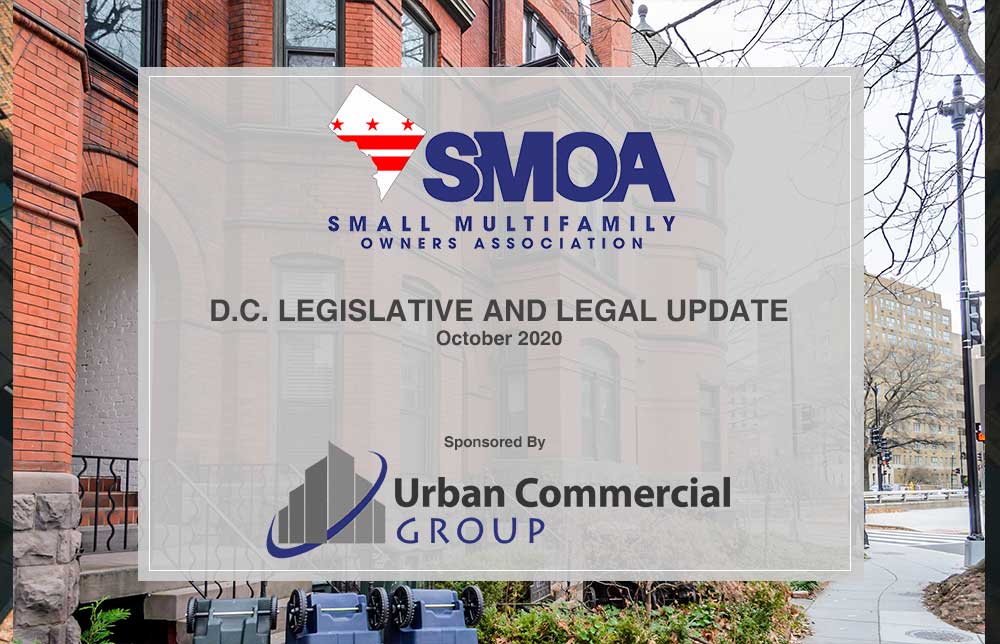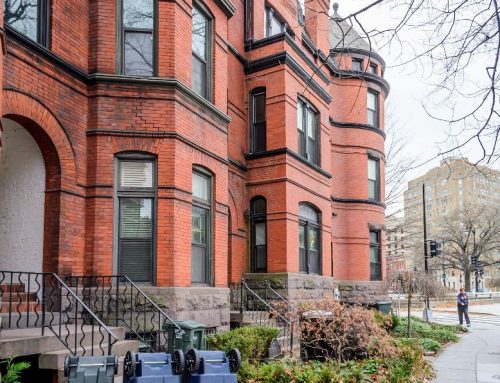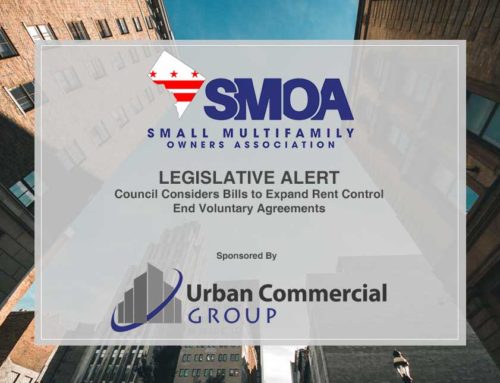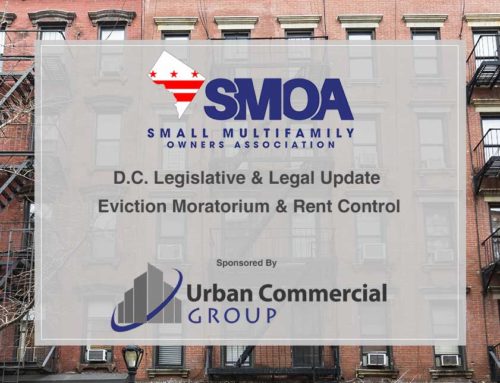This is an update on several recent legal and legislative matters that seriously impact small rental property owners. There are major developments concerning the eviction moratorium, emergency rental assistance, and efforts to expand rent control that warrant the immediate attention of small rental property owners.
New Emergency Law Burdens Evictions & Screenings
The Council has used the public health emergency to misuse its emergency lawmaking powers. The Council has passed major pieces of legislation that significantly impact small rental property owners that could have gone through the normal legislative process.
Councilmembers Mary Cheh and Brianne Nadeu, led the Council approval of The Fair Eviction Emergency Amendment Act of 2020, last week.
This legislation makes it extremely more difficult to evict a tenant. The emergency law requires multiple 30-day notices, prohibits eviction proceedings for less than $600, and requires a housing provider to have a current business license in order to evict a tenant.
The law also increases burdens on housing providers regarding tenant screening. Providers must inform applicants in writing the criteria used for screening and the reason for any denial. It also prohibits denial solely based on an applicant’s credit score. The law also allows tenants to seal eviction records, provides for a $1,000 penalty for each violation, and requests that D.C. Superior Court increase the filing fee for evictions from $15 to $100.
It is an abuse of power to pass such substantial legislation concerning evictions on an emergency basis. This anti-property owner measure was passed with no public notice, no public hearings, no public debate during a moratorium on evictions. SOMA is requesting that the Council reconsider this legislation and allow it to go through the normal legislative process. SMOA will host a webinar, discussing the new law in detail at 3 pm Tuesday, October 20, 2020. Please visit our website to register.
The Council also used its emergency legislative power to place a one-year moratorium on filings of Certificates of Assurance. The law required Certificates of Assurance to be issued to owners of rental housing built after 1985. If rent control was expanded to a property with a Certificate of Assurance, then the owners would be eligible to receive tax credits to compensate for the difference between the rent-stabilized rate and market rate.
Councilmembers Bonds and Silverman led the Council effort to impose a moratorium over the objection of Mayor Muriel Bowser. SMOA CEO Dean Hunter and General Counsel Richard Bianco testified at a public roundtable, held by Councilmember Bonds, that eliminating Certificates of Assurance would have a chilling effect on new multifamily housing.
Hunter strongly testified that providers of housing subject to current rent control laws should be given tax credits as compensation for providing affordable housing. Eliminating Certificates of Assurance clears the way for an expansion of rent control.
Radical Rent Control Threatens Small Landlords
The D.C Council is considering legislation, advanced by tenant advocates, that would expand rent control, harm small landlords, and adversely impact the availability of affordable housing. Several rent control bills might become law unless small landlords and property managers take immediate action. The Council is scheduled to hold hearings on these measures on November 5, 2020.
Bill 23-0873: The Rent Stabilization Program Reform and Expansion Amendment Act of 2020 introduced by Councilmembers Brianne Nadeau and Trayon White, would significantly expand rent control, amend DC law to harm small landlords, and adversely impact the availability of affordable housing.
The legislation would among other things: would limit annual rent increases to CPI only, expand rent control to four-unit buildings; expand rent control to all apartment buildings built before the year 2005; eliminate voluntary agreements, eliminate vacancy adjustments, severely limit hardship and capital improvement petitions.
The Council considered several provisions of this bill as stand-alone measures at a hearing on September 24, 2020. SMOA CEO, Dean Hunter, and General Counsel Richard Bianco and a dozen other members, testified in opposition to the bills. While these measures are less harmful than the Nadeu-White expansion bill they are being considered without any analysis on the fiscal impact on small rental housing providers.
The Voluntary Agreement Moratorium Agreement Act of 2020: This bill will prohibit all new voluntary agreements for a period of two years. This will significantly impair the ability of housing providers to make necessary improvements to properties in dire need. It will increase Condo conversions by making it impossible to compensate tenants for TOPA rights when buying a rent-controlled property.
We also testified in opposition to the Capital Improvement Petition Reform Amendment of 2020: This bill will among other things reduce the cap of a rent increase from 20% to 15%. The bill precludes Capital Improvement petitions from being used for Clean Energy Act requirements.
Another measure considered at the hearing was The Rent Concession Amendment Act of 2019. This bill significantly complicates and reduces the ability of housing providers to offer discounted rent such as “first-month rent is free.”
The issue of concessions for properties subject to rent-control is very problematic. With vacancies currently reaching 20 percent, many housing providers want to offer rent concessions and discounts but are unable to do so because of the elimination of rent ceilings. SOMA has requested DHCD to provide a briefing on the subject of Rent Control and concessions and discounts for housing providers.
These measures have real financial consequences. The middle of a pandemic is not the time to experiment with policies that have significant and negative financial impacts on small landlords who are already suffering. This will be the last chance to testify about the adverse impact of rent control on small landlords before the Council votes.
Two-thirds of the apartment buildings subject to rent control have 20 units or less. The DC Council needs to hear from small landlords and property managers. The tenant lobby has professional witnesses who don’t work and make every hearing. Small landlords are missing from the debate. If you have any interest or questions about testifying at the hearing on November 5, 2020, please contact Dean Hunter at 202-873-921 or Dhunter@SMOADC.org as soon as possible.
Emergency Rental Assistance Underutilized
SMOA is engaged in the development of a rental assistance program that will allow landlords to directly apply and receive rental assistance for non-paying tenants. District funds designed to help residents during the COVID-19 pandemic have been underutilized.
These programs include the permanent Emergency Rental Assistance Program (ERAP) as well as two new resources specifically designed for residents who have been economically hurt by the coronavirus pandemic: the COVID-19 Housing Assistance Program (CHAP) and the DHCD COVID-19 Tenant-Based Rental Assistance program.
SMOA has also asked the DC Council and the Department of Housing and Community Development to significantly increase public awareness efforts of existing rental assistance programs. SMOA hosted a webinar with DHCD Director Polly Donaldson detailing the programs. Replays of all webinars are available on our website. Multifamilyowners.org
SMOA is requesting that the Council amend the emergency eviction law to allow property owners to send information about the assistance programs to delinquent tenants. We are also requesting that DHCD send monthly notices to tenants advising them of the assistance programs.
DC Government has extended the public health emergency until December 31, 2020 and has banned any evictions until at least 60 days after the emergency is lifted. The Council also passed emergency legislation to prohibit notices from being sent to delinquent tenants during the moratorium. This means there will be no eviction filings until at least March 1, 2021.
SMOA has engaged the Council to amend the law to permit eviction proceedings for health and safety reasons. SMOA opposes the extension of the eviction moratorium because there has been no relief for landlords since the government has banned evictions. The government must pay rental assistance directly to landlords who are being impacted by non-paying tenants. SMOA General Counsel, Richard Bianco is involved in a legal challenge to the eviction moratorium.
SMOA is also fighting to get an amendment to the emergency law to allow increases in vacant units. There is no valid justification for prohibiting landlords from raising the rent on vacant units. This is an example of why the emergency law is overly broad and punitive to small landlords. The Council must amend the emergency law to correct this problem.
Housing Provider Ombudsman Needed
SMOA has requested that the Department of Housing and Community Development immediately staff the now vacant position of Housing Provider Ombudsman. (HPO). The Housing Provider Ombudsman is a staff position at DCHD dedicated to assisting small rental property providers. The HPO should be a resource to help small landlords navigate and comply with the District’s complex landlord-tenant laws, rules, and policies. It is especially critical that this position is filled now, during the COVID Emergency. Small landlords desperately need technical assistance to understand and comply with the rapidly changing emergency laws.
The fact that this position has been vacant for two years, supports the need to create an independent office. Small landlords need the equivalent of the Office of Tenant Advocate. Providing such a resource to small rental housing providers would increase the availability of rental housing in the District. Small landlords are not equipped to afford the costs necessary to hire legal and compliance professionals. Moreover, while there is an abundance of free legal resources for tenants, there is no free legal assistance to help small landlords.
UPCOMING EVENTS
SMOA will host the Webinar: The D.C. Landlord’s Guide to The New Eviction and Tenant Screening Law, The Fair Eviction Act, on Tuesday, October 20, 2020, at 3 pm. We will provide a comprehensive overview of the new eviction and tenant screening law. Please register on our website.
The Multifamily Owners Podcast, premiere series will address the impact of DC rent control on small landlords. The series will be released on October 30, 2020. Check out the podcast trailer and subscribe to get the latest episodes at UrbanCre.org.
JOIN THE FIGHT
SMOA is working very hard to advance the legal and political interests of small rental housing providers. DC is one of the most anti-landlord jurisdictions in the country. Join the fight, share this newsletter with as many other rental housing providers as you can. Please support the effort by joining SMOA today. https://multifamilyowners.org/







Leave A Comment